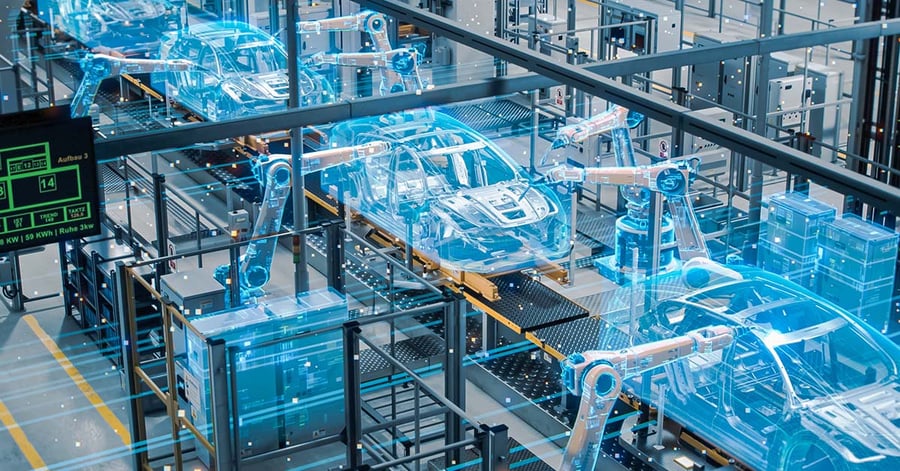
Why Digital Transformation Is Needed In The Auto Ancillaries Industry
Published :

The auto ancillary industry presents an interesting case for digital transformation. While it is one of the largest manufacturing sectors globally, with a combined value of $1 trillion in annual sales, it remains relatively fragmented and inefficient. In addition to the potential benefits of switching to digital practices, there are also several challenges, like the rising manufacturing cost, which can be solved by effective digital transformation. This is where Automotive ERP - ERP software made for the automotive industry helps.
This article looks at the various challenges the auto ancillaries industry faces, how digital transformation presents a solution, and how technology such as Automotive ERP can enable such businesses to transition to a digital future.
Considering the sheer size of the auto ancillaries industry and its impact on the global economy, the sector must continue to thrive. However, in recent decades, the industry has been facing several challenges.
The auto ancillary industry is highly fragmented, with small and medium enterprises dominating the landscape. Although this may be an advantage in terms of cost, it can make it difficult for these small businesses to invest in technology and adopt digital transformation. Moreover, sharing information is difficult for each company operating on a stand-alone IT system. This is where ERP software can help.
With stretched supply chains, which have proven to be a debilitating problem in recent years, as seen during Covid-19, the industry needs to look at new solutions. These must be able to improve the management of supply chains by, for example, predicting the requirements of raw materials over the next few months so that their availability can be ensured. Automotive ERP can be a game-changer in this aspect.
The growth in manufacturing costs around the world is real. Many parts of the manufacturing process in the industry are capital-intensive, requiring significant upfront investments, including in manpower. This is where cost-effective ERP software can make a difference.
With the increased proliferation of automobiles over the last three decades and ever-growing demands with the increase in income levels, the industry has faced a critical challenge — timely delivery of orders. Orders are often delayed, which increases difficulties for manufacturers and those involved in assembly line production of vehicles up the value chain. Here, Automotive ERP can streamline processes and improve service delivery.
Ancillary companies must also be able to reduce costs to remain competitive. Fortunately, digital transformation, powered by Automotive ERP and ERP software, can help in this regard by enabling companies to operate more efficiently. For example, digital transformation can improve supply chain management by connecting disparate systems and tracking inventory to allow for more accurate forecasting. This enables companies to forecast demand for the parts more accurately.
Robust IT infrastructures are essential for many modern business functions, including processing orders and managing inventory. These systems are likely to become increasingly crucial to auto ancillary companies. Digital transformation can help companies meet these needs by automating manual processes, such as purchasing goods, to reduce errors and improve efficiency. This can allow auto ancillary companies to handle larger volumes of orders.
Widespread technology adoption can address the many challenges the auto ancillaries industry currently faces.
By digitising the production process and mapping the entire flow, one better understands the various causes of downtime and available spare capacity. Production can be switched on a just-in-time basis, reducing the need for inventory, minimising capital requirements, and making supply chain risk management more manageable.
Across many industries, the customer experience is changing as companies move to provide digital alternatives for in-person interactions. Online spare part sales in many countries are increasing, with customers enjoying prompt delivery and competitive pricing. This is where Automotive ERP can make a significant difference.
Modern supply chains are highly complex, often involve several parties, and lack real-time operational visibility. For example, a spare part may be produced in one country, shipped to a second country for packaging, and then sent to a third country for delivery to the customer. When all the stakeholders are connected digitally, it is easy to track inventory, making the supply chain transparent. ERP software can play a crucial role here.
Companies must adopt digital transformation strategies to remain competitive in the auto ancillary industry. Digital transformation can create several business opportunities and benefits. For example, suppliers of spares can manage their inventory and track their shipments in a better way and withstand supply-chain disruptions. For industry customers, digital transformation can help them save time and money while improving their experience.
Adopting digital transformation can give the industry a competitive edge, building new business models and products around core competencies such as rapid prototyping and investment in R&D for developing advanced robotics and robotics-enabled applications. For example, online repair services enable consumers to track the health of their assets and receive genuine spare parts from service providers.

All Rights Reserved. © Copyright 2024. Ramco Systems.